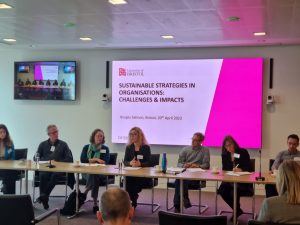
The Professional Liaison Network, part of the Faculty of Social Sciences and Law at the University of Bristol delivered a collaborative workshop on Sustainability Strategies in Organisations. This event, hosted by Burges Salmon looked to promote discussion on the key challenges around developing sustainability strategies in organisations.
The goal of being sustainable
Companies are now expected to deliver more to society, particularly in the areas of environment, social and governance, under the broader goal of ‘sustainability’. Discussion around implementing sustainable business practices is becoming more mainstream which means it is important to collaborate across sectors to find the best way forward for businesses and society. These issues and potential solutions were raised by attendees, ranging from academia to professionals from different sectors and organisations.
Workshop aims:
This half day co-collaborative workshop sought to bring together individuals from different types of organisations with University of Bristol academics. It focused on how sustainability should be an integral part of any organisational strategy and aimed to provide an opportunity for participants to learn from each other and promote discussion on the key issues and challenges. It highlighted the value that academic research can bring to organisations in this area and made available seedcorn funding to promote co-collabortive scoping research projects emanating from the event.
The workshop began with a short plenary session covering the main themes of accountability, legal and supply chain sustainability and a short presentation from Kirsty Green-Mann, Burges Salmon on “Sustainability Strategy – a Business Perspective”. The panel discussion and subsequent group activities throughout the event allowed for an opportunity for us as the attendees to ask and share ideas on potential solutions for sustainable practices within business.
We had some amazing speakers and panellists at the event, from academics at the University of Bristol to external stakeholders from businesses and alternative organisations.
The panellists:
- Stuart Cooper (University of Bristol)
- Judy Kuszewski (Sancroft)
- Giovanna Michelon (University of Bristol)
- Tamzyn Smith (University of Bristol)
- Lizzi Testani (Bristol Green Capital)
- Charlotte Villiers (University of Bristol)
- Steven Webb (Lloyds Banking Group)
- Rachel Weller (Sancroft)
- Don Rintoul (University of Bristol) panel chair
Challenges of being sustainable

The Panel discussion and groups activities covered the areas of:
- Corporate Accountability, Impacts of EU Laws and Mandates
- Just Transition to Sustainability
- Tools and Technologies for Achieving Sustainability
We learnt that the current way of doing business is unsustainable and businesses must be accountable for both environmental and social impacts. Sustainable development has implicit limitations with key takeaways including the role of legislation regarding sustainability, such as changes in the law.
An example of legislation that may apply to this context would be enforcing mandatory disclosure for companies on their impacts on the environment and society. Though mandatory disclosure has benefits, measuring and reporting on sustainability, legislation fatigue, and greenwashing (misleading the public about being environmentally responsible) are some of the challenges.
The challenge of sustainability reporting is that different stakeholders have different priorities, making it difficult to meet them all. For instance, small and medium-sized businesses struggle with sustainability practices because they do not have the infrastructure to successfully implement sustainable practices. The answer: organisations should work together and adopt key principles.
To try and combat the issue of greenwashing, suggestions included monetising environmental goods as an option. Though companies have a personal stake in corporate social responsibility, monetising environmental goods could be another incentive for them to transition to more transparent sustainable business practices. Thishighlighted that compared to the EU, the UK is behind in sustainability legislation, despite having an early lead a few years ago.
Another legal aspect that was discussed is that of a ‘just transition’ – a process for finding ways to transition to more sustainable business practices without compromising on human rights. This requires putting human rights at the centre, better global governance, local knowledge, and diversity in decision-making.
How can businesses improve sustainability?
Our group discussions concluded that education, collaboration, and experimental technology are crucial tools to promote sustainability, while monetising good impacts is challenging, because how do you universally quantify a ‘good impact’? Solutions for businesses included partnerships, equality, inclusion, and global collaboration. A particularly interesting suggestion was a Dragon’s Den-style programme with sustainable projects funded by taxpayers.
Technological advancements were another trending discussion in helping businesses become more sustainable and offered an interesting approach, including learning about the challenges of AI and corporate sustainability. These included data gaps, standardisation, and understanding key terms. General concerns regarding sustainability included data consistency, data integrity, and data collection.
The topic of technology’s role in sustainability was particularly interesting to me because, in one of my assignments, I researched the use of blockchain technology in creating more sustainable supply chains. It was extremely rewarding for me to be able to hear from people in the industry, whom I hope would be my future employers, talking about the very things I am learning as part of my course. It gives me great confidence that my studies here at Bristol will be truly relevant and give me insight into the market and business in my future, beyond graduation.
Samantha Chihuri, MSc International Business and Strategy: Global Challenges student.
Find out more about the Professional Liason Network (PLN) service and future events.

